Do you have a question about the Aastra DIALOG 4223 PROFESSIONAL and is the answer not in the manual?
Basic safety precautions to reduce risk of fire, electrical shock, and personal injury.
Instructions for proper disposal of electronic products according to local regulations.
Overview of the telephone's display and dynamic function keys.
How to handle incoming calls from internal extensions.
How to handle incoming calls from external numbers.
Steps to answer incoming calls using handset or handsfree.
Procedures to end an active call.
How to handle a second incoming call while on an active call.
Answering calls ringing on other extensions.
Picking up calls with caller identification before answering.
How to activate silent ringing to avoid audible alerts for incoming calls.
Procedures for placing internal and external calls manually.
Using speed dialling for quicker call placement.
How to place calls using pre-programmed line or repertory keys.
Redialing the last external number dialed.
Overview of Call by Name and Call Log file services.
Understanding the status of internal calls and related services.
Activating call-back when the called party is busy.
Activating call-back when the called party does not answer.
Broadcasting a voice message to a free extension's loudspeaker.
Activating protection against incoming call signals during a conversation.
Placing external calls using another party's extension.
Exchanging dialling codes directly with remote servers.
Procedures to end an ongoing or establishing call.
Understanding how external calls are routed and discriminated.
Activating the loudspeaker during a conversation.
Switching call mode from handset to handsfree.
Switching call mode from handsfree to handset.
Temporarily deactivating the microphone during a call.
Controlling the volume for loudspeaker or handset.
Consulting another party without ending the current call.
Alternating between two conversations or brokering a call.
Connecting two call parties directly.
Establishing a conference call with multiple participants.
Temporarily placing a call on hold.
Parking calls to retrieve them later on another extension.
Accessing the integrated directory to find and call parties by name.
Reviewing and redialing unanswered calls.
Redirecting calls when there is no answer.
Redirecting calls when the extension is busy.
Immediately redirecting all incoming calls.
Disconnecting calls and indicating Do Not Disturb status.
Redirecting calls to a mini-messaging service.
Setting up case-by-case call forwarding rules.
Deactivating a previously defined variable call forward.
Activating a pre-defined call forward by pressing the Call-Fwd key.
Deactivating a pre-defined call forward via the Call-Fwd key.
Remotely programming call forwarding from another extension.
Redirecting calls you prefer not to answer to another recipient.
Understanding how call forwarding is indicated and displayed.
Exchanging short text messages over the ISDN network.
Sending a predefined message when a party does not answer or is busy.
Receiving mini-messages from parties who attempted to contact you.
Redirecting calls to a mini-messaging service upon absence.
Overview of integrated voice mail system and mailbox access.
Managing mailboxes in answering, recording, or personal assistant modes.
Forwarding calls to a voice mailbox based on conditions.
How callers are greeted and leave messages in the mailbox.
Notification of new voice messages via icon or voice announcement.
Notifying external numbers of new voice messages.
Accessing voice messages from the extension or other internal numbers.
Accessing voice messages from external DTMF analogue extensions or GSM phones.
Overview of services for processing and personalizing voice messages.
Functions for navigating and listening to voice messages.
Automatically calling back the party who left a message.
Options for directing callers to a personal assistant or attendants.
Services for managing greeting messages and answering options.
Setting up external notification for new voice messages.
Setting and managing the user password for accessing voice mail services.
Using a common mailbox for hunt group members.
Distributing voice messages to a mailing list via a common mailbox.
A common mailbox dedicated to facility attendants.
Accessing voice mail via a PC application.
Merging voice mail with email for notifications.
Overview of services for team collaboration and call management.
Remotely monitoring colleagues' extension statuses.
Distributing calls among department members.
Simplified call pick-up service within a hunt group.
Answering hunt group calls without moving to another extension.
Temporarily withdrawing from a hunt group to receive only personal calls.
Managing standby status for secondary hunt groups via dialling.
Supervisors opening/closing hunt groups to traffic.
Displaying the number of calls in ICD group waiting queues.
Sending voice pages to groups of extensions.
Managing a personal group of extensions for unified access.
Restricting extension use by third parties when absent.
Requesting system reminders for appointments.
Playing background music on idle extension loudspeakers.
Step-by-step guide to locking and unlocking the extension.
Setting up an automatic appointment reminder.
Activating or deactivating background music playback.
Automatically calling attendants when the phone is off-hook.
Understanding protection against external calls being diverted to attendants.
Controlling the transmission of your identity to external parties.
Requesting tracing of malicious calls from unknown callers.
Recording telephone conversations for later listening.
Displaying and verifying the cost of external calls.
Imputing external call costs to different accounts using codes.
Overview of personalization options via the Menu key.
Steps to enter the extension's programming mode.
Programming line keys with numbers or service codes.
Programming repertory keys on attached satellite panels.
Assigning a call forward to the Call-Fwd key for quick activation.
Setting ring melodies, ring volume, and listening volume.
Setting voice announcement reception to unidirectional or bidirectional.
Setting and managing the user password for security.
Accessing the internal dialling plan for facility services.
Table listing services and their required dialling prefixes.
Overview of additional services available to system attendants.
Allowing attendants to interrupt ongoing calls for urgent matters.
Allowing attendants to override Do Not Disturb status for urgent calls.
Attendants controlling their active/inactive status for general calls.
Activating or deactivating the general calls acceptance service.
Handling calls from a door phone, similar to general calls.
Picking up general calls ringing on the common bell.
Attendants defining call forwards for any user's account without restrictions.
Overview of services specifically for attendants.
Processing general calls during attendant's shift.
Handling general calls when no attendants are active.
Controlling attendant position's ability to answer general calls by shift.
Deactivating attendant position at the end of shift.
Programming a system-wide immediate call forward for all incoming calls.
Setting up a general call forward for the facility.
Cancelling a previously programmed system general call forward.
Activating or deactivating the common bell service for the facility.
Accessing basic system management services for attendants.
Resetting user passwords for extensions.
Correcting the system's date and time settings.
Managing lists of abbreviated numbers.
Creating, modifying, or deleting abbreviated numbers.
Assigning names to abbreviated numbers for easier identification.
Checking the quality of telephone greetings and call statistics.
Resetting charge counters to zero or printing reports.
Notifying attendants of major alarms within the telephone system.
Consulting alarm messages to diagnose system issues.
How the system integrates into a QSIG-MD private network.
List of services available within the private network.
Performing call operations within the private network.
Switching calls from IP network to non-IP network due to quality issues.
Connecting handset and line cords to the extension.
Attaching and adjusting the support feet for optimal viewing angle.
Adjusting the screen angle for better visibility.
Inserting or removing the label identifying function keys.
General tips for installing and cleaning the telephone.
Instructions for mounting the extension on a wall.
Overview of optional accessories like satellite key panels and headsets.
Connecting satellite key panels to the extension.
Connecting the add-on interface module and external devices.
Connecting a headset to the extension's headset jack.
Operating the extension using a connected headset.
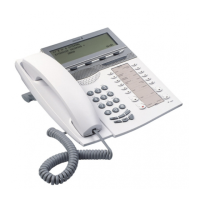
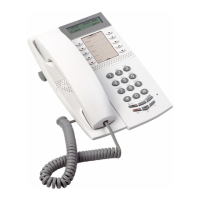
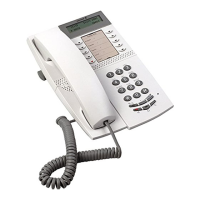


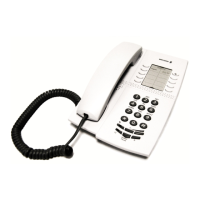

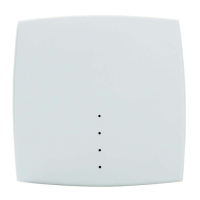
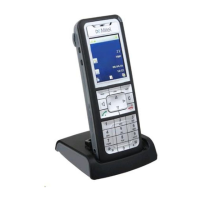
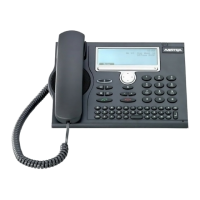
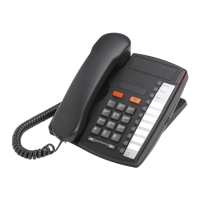
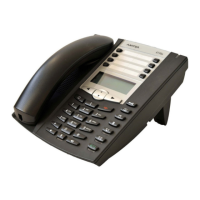
